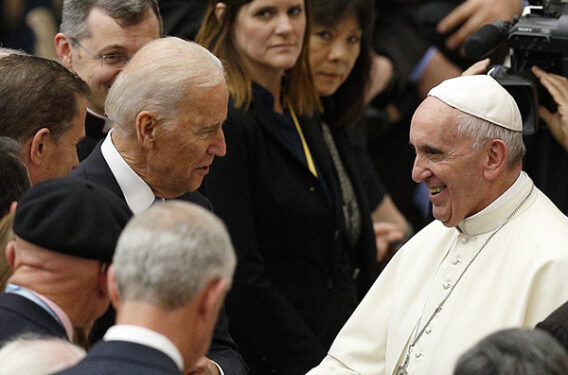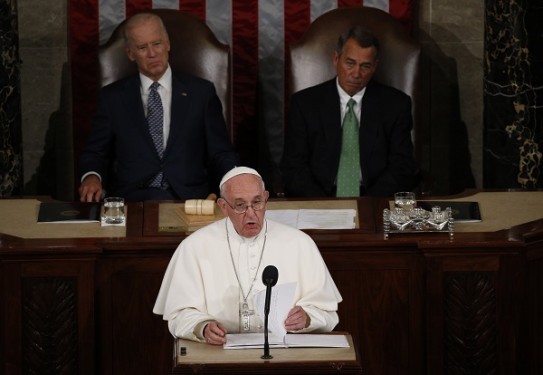
WINDSOR TERRACE — In line with papal tradition, Pope Francis relayed well wishes and messages of hope and prayer to President Joseph R. Biden Jr. on Inauguration Day, Jan. 20. Biden is the second Catholic president, following John F. Kennedy, who was elected as the United States’s 35th president in Nov. 1960.
“Under your leadership, may the American people continue to draw strength from the lofty political, ethical, and religious values that have inspired the nation since its founding,” the pontiff wrote the day Biden became the 46th president.
“At a time when the grave crises facing our human family call for farsighted and united responses, I pray that your decisions will be guided by a concern for building a society marked by authentic justice and freedom, together with unfailing respect for the rights and dignity of every person, especially the poor, the vulnerable and those who have no voice.”
Pope Francis concluded his message, saying: “I likewise ask God, the source of all wisdom and truth, to guide your efforts to foster understanding, reconciliation, and peace within the United States and among the nations of the world in order to advance the universal common good. With these sentiments, I willingly invoke upon you and your family and the beloved American people an abundance of blessings.”
[Related: Pope Francis Prays Biden Works to Heal Divisions, Promote Human Dignity]
Pope Francis and Biden have had other in-person meetings and correspondences with each other, stemming back to when Biden served as vice president under Barack Obama’s administration from 2009 to 2017.
As the designated lead presidential delegate, Biden attended the Inauguration Mass celebrating the Pontificate of His Holiness Pope Francis in March 2013. The two met again in September 2015 when Pope Francis visited the White House during his nearly week-long Apostolic Visit to the United States. Biden sat behind the pope as Pope Francis addressed and delivered remarks to Congress’s joint session in the U.S. Capitol. Biden and Dr. Jill Biden had a private meeting with the pontiff as well during that visit.

In April 2016, Biden spoke at a conference held at the Vatican on regenerative medicine — talking specifically about cancer research and how cancer was an “international problem … that affects all races, all religions.” Biden’s eldest son, former Delaware Attorney General Beau Biden, was diagnosed with brain cancer in 2013 and passed away from the disease at 46 in May 2015. Biden and Pope Francis also privately spoke with one another before and after the conference.
The Holy Father called Biden on Nov. 12, congratulating him on winning the 2020 presidential election after major news outlets called the race for Biden.
“The president-elect thanked His Holiness for extending blessings and congratulations and noted his appreciation for His Holiness’s leadership in promoting peace, reconciliation, and the common bonds of humanity around the world,” said the Biden transition team at the time.
The team’s statement also said Biden “expressed his desire to work together on the basis of a shared belief in the dignity and equality of all humankind on issues such as caring for the marginalized and the poor, addressing the crisis of climate change, and welcoming and integrating immigrants and refugees into our communities.”
Catholics have criticized Biden on his pro-abortion agenda. Biden has said he will fight state-level policies limiting access to abortion and is looking to repeal the Hyde Amendment, which has prohibited federal funding of abortions under Medicaid and other federal programs since being enacted into law in 1976.
Regarding immigration, Biden intends to reverse Trump-era policies that separate families at the U.S.-Mexico border and reinstate the Deferred Action for Childhood Arrivals (DACA) program. One of Biden’s first executive orders as president was lifting the travel ban from primarily Muslim countries that had been issued by Trump in January 2017. On the environment and climate change fronts, Biden also signed an executive order on Jan. 20 to reverse the Trump administration’s withdrawal from the 2015 Paris Agreement — which seeks to limit global warming and reduce greenhouse gas emissions.
